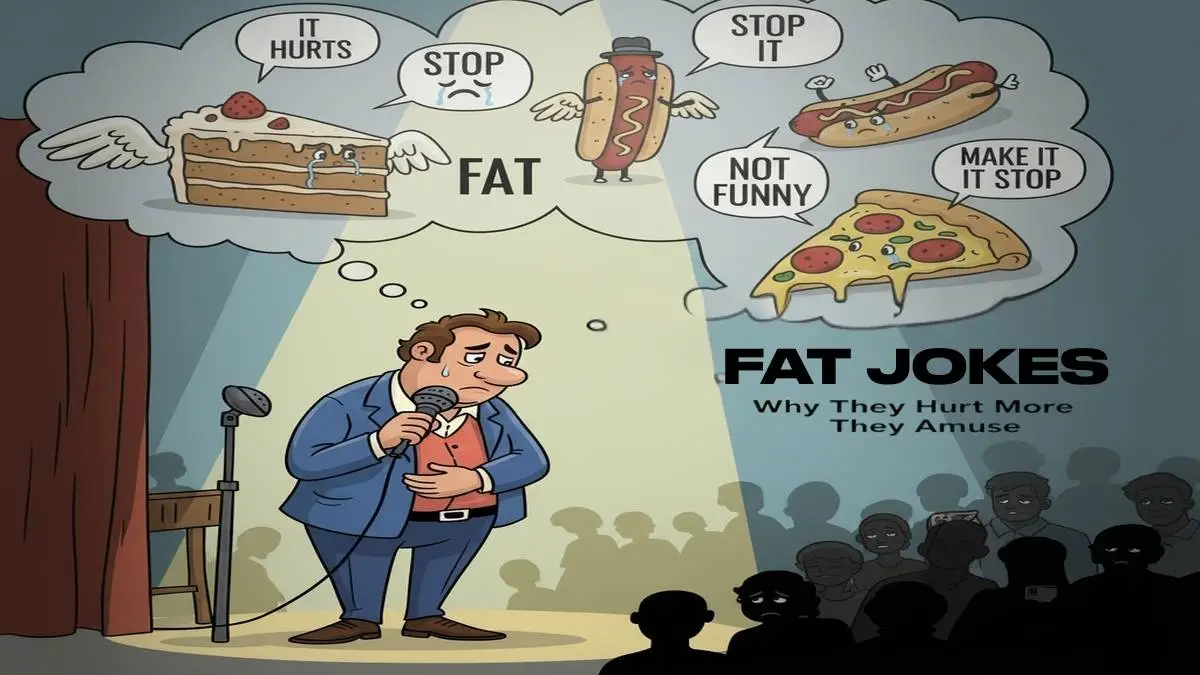ALL MESSAGES
Fat Jokes: Why They Hurt More Than They Amuse

Humor has always been an important part of human interaction, helping people bond, reduce stress, and navigate social situations. However, not all jokes are harmless. Fat jokes, jokes, or remarks that target a person’s weight or body size fall into a category of humor that often perpetuates stereotypes and reinforces damaging societal attitudes. While some individuals may dismiss them as “just a joke,” the reality is that these comments can have lasting negative effects on mental health, body image, and inclusivity in society.
Table of Contents
What Are Fat Jokes?
Fat jokes are jokes or remarks that specifically make fun of a person’s body weight or physical size. They often involve exaggerating or mocking behaviors, such as overeating, lack of exercise, or poor health, that society incorrectly associates with larger bodies.
Common examples include:
- Comments suggesting overweight individuals lack willpower.
- Jokes about eating habits or food choices.
Though they may appear lighthearted to some, these remarks reinforce deeply ingrained stereotypes that can have lasting consequences.
Why “Just Joking” Is Not an Excuse
A common defense of fat jokes is, “I was just joking.” While intent matters, the impact is what counts most. Humor that degrades someone’s identity or appearance is rarely harmless.
It is also worth noting that people who are overweight may sometimes laugh at fat jokes to fit in socially or to appear unaffected. However, this doesn’t mean the joke is harmless; it often masks deeper pain or internalized shame.
Why Fat Jokes Are Considered Offensive
Humor is subjective, and what one person finds funny, another may find hurtful. But fat jokes are problematic for several reasons:
- Reinforcing Negative Stereotypes: These jokes perpetuate the idea that overweight people are inherently lazy, undisciplined, or unhealthy. Such stereotypes are overly simplistic and do not reflect the complex factors, such as genetics, environment, stress, or medical conditions, that influence body weight.
- Encouraging Bullying and Harassment: Fat jokes are often used in schools, workplaces, and social circles as a form of ridicule. When repeated, they normalize bullying behavior and create a hostile environment for those targeted.
- Damaging Self-Esteem and Mental Health: Research shows that body-shaming, including fat jokes, can lead to low self-esteem, depression, anxiety, and even eating disorders. People who internalize these negative messages may feel unworthy or ashamed of their bodies.
Fat Jokes and Mental Health
The mental health impact of fat jokes cannot be overstated. Studies suggest that individuals who are frequently exposed to body-related teasing or ridicule are at higher risk of developing:
- Depression and Anxiety
- Disordered Eating (binge eating, restrictive dieting, or unhealthy weight control behaviors)
- Social Isolation due to fear of ridicule
For children and adolescents, fat jokes are especially damaging. They may contribute to lifelong struggles with body image, self-confidence, and relationships.
Building Respectful and Inclusive Humor
Humor does not have to come at the expense of others. There are countless ways to be funny without reinforcing harmful stereotypes or hurting people’s feelings. Some alternatives include:
- Observational Humor: Making light of everyday experiences that people can relate to.
- Situational Humor: Finding the funny side of common challenges without targeting individuals.
- Wordplay and Clever Puns: Using creativity instead of mockery.
Encouraging positive humor helps foster inclusivity while still allowing people to share laughter and joy.
Building a Culture of Respect
Addressing fat jokes is about more than just avoiding offensive humor; it’s about building a culture that values respect and inclusivity. By challenging stereotypes and promoting body diversity, society can reduce stigma and create safer, healthier environments for everyone.
What We Can Do
- Educators can teach students about respectful communication and the harms of body-shaming.
- Parents can model body-positive behavior at home.
- Workplaces can enforce policies that prevent weight-based harassment.
FAQs
Q1. Why are fat jokes harmful?
It reinforces negative stereotypes, lowers self-esteem, encourage bullying, and normalize body-shaming.
Q2. Are fat jokes ever acceptable if the person laughs along?
Even if someone laughs outwardly, it does not mean they are not hurt internally. The long-term effects of such jokes can still be damaging.
Q3. Do fat jokes motivate people to lose weight?
No. Research shows that weight stigma discourages healthy behavior and is linked to weight gain, not weight loss.
Conclusion
Fat jokes are not harmless entertainment. They perpetuate negative stereotypes, harm mental health, encourage bullying, and contribute to systemic discrimination. While humor is an important part of life, it should never come at the expense of another person’s dignity.
By rejecting it and choosing humor that uplifts rather than belittles, we take an important step toward creating a more inclusive and compassionate society. Respect for body diversity isn’t just about kindness; it’s about justice, equality, and human dignity.
-

 FRIENDSHIP MESSAGES4 months ago
FRIENDSHIP MESSAGES4 months ago100+ Heart Touching Sorry Messages for Friends
-

 ANNIVERSARY WISHES8 months ago
ANNIVERSARY WISHES8 months ago100+ Beautiful Engagement Anniversary Wishes Messages and Quotes
-

 BIRTHDAY WISHES7 months ago
BIRTHDAY WISHES7 months ago300+ Happy Birthday Wishes for Brother | Heart Touching Happy Birthday Brother
-

 BIRTHDAY WISHES8 months ago
BIRTHDAY WISHES8 months ago200+ Unique Birthday Wishes for Your Best Friend to Impress on Their Big Day




















